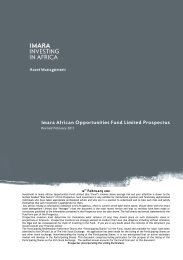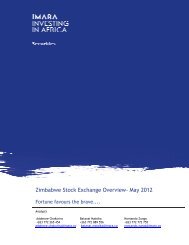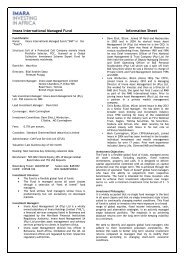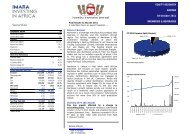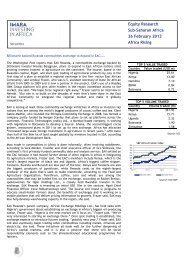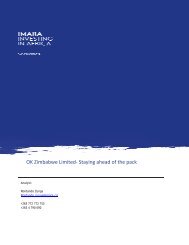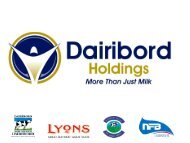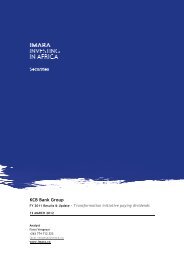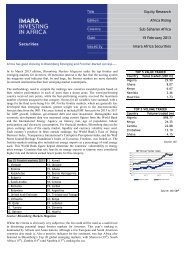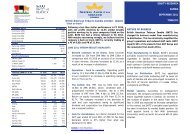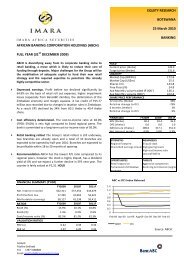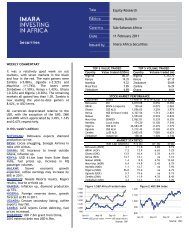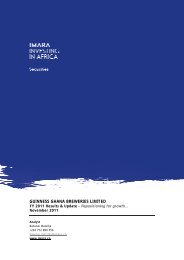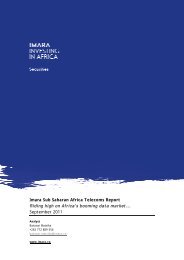Sub-Saharan Africa Stock Markets 2010 Review & 2011 ... - Imara
Sub-Saharan Africa Stock Markets 2010 Review & 2011 ... - Imara
Sub-Saharan Africa Stock Markets 2010 Review & 2011 ... - Imara
Create successful ePaper yourself
Turn your PDF publications into a flip-book with our unique Google optimized e-Paper software.
Market Outlook for <strong>2011</strong><br />
No surprises in the political landscape expected. There<br />
are basically three main political parties in Malawi which<br />
include the United Democratic Front (UDF), the Malawi<br />
Congress Party (MCP) and the Democratic Progressive<br />
Party (DPP). However, the ruling Democratic Progressive<br />
Party (DPP) continues to consolidate its hold on power<br />
after it won 114 seats in the 2009 election. As a result,<br />
there appears to be diminishing influence from parties<br />
such as the United Democratic Front (UDF) and the Malawi<br />
Congress Party (MCP). While President Bingu wa Mutharika<br />
is from the UDF party, we expect that the DPP’s increase<br />
in power will enable it to push though policy reforms.<br />
Economic hurdles still remain in the picture. There has<br />
been significant progress in reducing the annual average<br />
inflation from the previous 8.4% in 2009 to about 7.4% in<br />
<strong>2010</strong>. The decrease in annual inflation was largely<br />
associated with a decrease in the food index by 3.1% and<br />
non-food inflation by 0.2%. However, the main issue is<br />
that the economy depends on substantial inflows of<br />
economic assistance from the IMF, the World Bank, and<br />
individual donor nations. The over-dependence of the<br />
fiscus on concessional grants is evident from the fact that<br />
in the <strong>2010</strong>/<strong>2011</strong> budget, grants of MWK 85.0bn (USD<br />
566.0m) from donors represented 30% of total revenue.<br />
Generally, the government is faced with many challenges<br />
that include developing a market economy, improving<br />
educational facilities and dealing with the rapidly growing<br />
problem of HIV/AIDS.<br />
Foreign currency shortages may stifle growth. The<br />
Kwacha depreciated by 2.52% against the USD during the<br />
review period of January to December <strong>2010</strong> from its<br />
trading position of MWK 147.00/USD to MWK 145.81/USD.<br />
However, the foreign exchanged system is a pegged one<br />
and the MWK is evidently overvalued. It is unlikely the<br />
MWK will allowed to free-float, as authorities are<br />
concerned about the inflationary impact of a weaker MWK<br />
and also because it would increase the costs of the<br />
fertilizer subsidy programme and push other imported<br />
costs higher. Our view is that the fixed peg has<br />
precipitated foreign currency shortages and amplified the<br />
external shocks to the economy. At current levels of about<br />
MWK 150/USD, we believe the MWK is overvalued.<br />
We expect market development to gather momentum as<br />
corporate activities increase in <strong>2011</strong>. While we expect a<br />
lackluster trading year on the MSE, we believe corporate<br />
actions will increase. NBS Bank issued an additional<br />
26,191,909 ordinary shares as bonus shares as at the<br />
record date of 24 December, <strong>2010</strong>. The additional bonus<br />
shares were listed on the Exchange on 4 January <strong>2011</strong>.<br />
Other corporate transactions include the sale of its life<br />
assurance business to Sanlam (SA) by NICO Holdings. In<br />
addition, indications are that NBM will acquire an existing<br />
investment bank in Zimbabwe. We expect such<br />
transactions to deepen the local stock market and improve<br />
liquidity levels.<br />
Top Picks for <strong>2011</strong><br />
COMPANY Price P/E P/BV Recom.<br />
Hist T+1 T+2 Hist T+1 T+2<br />
M PICO 3.10 3.3 3.1 3.0 0.6 0.6 0.6 BUY<br />
NBM 58.65 8.7 8.3 7.9 2.8 2.1 1.5 BUY<br />
NBS 11.00 6.7 6.4 6.1 2.2 2.2 1.4 BUY<br />
NICO 10.00 4.5 4.3 4.1 1.4 1.4 1.2 BUY<br />
PIM 6.25 6.2 5.9 5.6 0.6 0.5 0.5 BUY<br />
Press Corp. 177.00 3.8 3.6 3.4 0.9 3.1 2.7 BUY<br />
Std. Bank 100.00 7.5 6.7 6.1 2.6 2.5 1.8 BUY<br />
The <strong>2011</strong> Hot <strong>Stock</strong>s<br />
As highlighted in the <strong>2010</strong> review, the MSE largely<br />
traded in negative territory since June <strong>2010</strong>. However,<br />
coinciding with Malawi’s foreign exchange shortage and<br />
combined with the MSE’s relatively low liquidity, this<br />
has meant sell orders by foreign investors remain<br />
outstanding, creating a share overhang in most<br />
counters. In our view, the MSE currently offers some<br />
buying opportunities for long-term investors.<br />
Another exciting point is that dividend yields are<br />
generally expected to remain strong, although some of<br />
the stronger performing companies, especially in the<br />
banking sector, could benefit their shareholders better<br />
through the distribution of higher rates of dividends.<br />
Given a dividend yield at about 4.2%, the market is<br />
relatively attractive to local investors, given local<br />
deposit rates of about 2.5%.<br />
Generally, Malawi has favorable climatic conditions that<br />
provide optimal conditions for sugar production. In our<br />
view, companies such as Illovo would be a safe haven<br />
for MSE investors.<br />
We also like property company MPICO, given that it<br />
maintains and manages an investment portfolio of high<br />
quality retail, industrial and commercial properties<br />
located mainly in the major metropolitan areas of<br />
Malawi, which offers investors sustainable and growing<br />
income and resultant capital appreciation.<br />
National Bank of Malawi (NBM) cannot be ignored,<br />
given that it is the largest bank in Malawi by all<br />
quantitative metrics, controlling c45% market share by<br />
deposits and c50% by advances book. As the largest<br />
bank in the country with direct exposure to the<br />
country’s largest corporates, NBM offers investors a<br />
direct play on Malawi’s economic growth story.<br />
Other recommended BUYs include NBS, NICO Holdings,<br />
PIM, Press Corporation and Standard Bank.<br />
14



